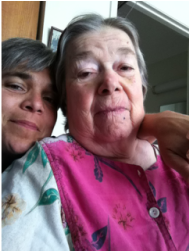 Tamara Jaffe-Notier, May 2014 “...all I know is that we've been fighting for marriage equality for years...we've come this close on more than one occasion..and then Tamara goes to Springfield, and, bam, we have marriage equality,” my friend David joked. It was fun to be part of the final push for marriage equality in Illinois. Oak Park Temple chartered a bus, and I was one of many aboard. Each person who marched, in the rain, on October 22, 2013, felt a little bit of the magic of the day. Many of us weren't convinced that Senate Bill 10, the “Religious Freedom and Marriage Fairness Act,” would be called for a vote any time soon—it had already been postponed once—but we still chanted with conviction, “gay, straight, black, white, marriage is a civil right.” Or something like that. We'd made our phone calls, and now we marched. The wind blew, and the rain came down. Some of us were “bearing the burden of the other,” and some of us were bearing our own burden. How did I, a gentile by birth and a Christian by culture, come to march with Oak Park Temple? Struggling to write this piece, I was accompanied by a memory of myself at 18, ironing shirts in the kibbutz laundry. The dry heat of the iron across the shirts smells good. In the distance I hear the goat-bells of the flocks tended by the Arab shepherds. My hands are wrapped in gauze bandages, recovering from lye burns and blisters from a reaction to the soap we used to scrub the kitchen floor, and a kibbutznik with a dark blue number tattooed on the inside of her wrist is yelling at me in Russian or Yiddish. She wears a small red lapel pin of the profile of Lenin. I can't shake her impression that I understand Russian. While the holocaust survivor yells at me, I see through the unscreened, open window above the ironing board that my friend Yuval is standing outside. He brings me an orange. I indicate the bandages on my hands, and he peels the orange for me, showing off, spiraling the peel into one long piece. Yuval tells me it’s a Jaffa orange, and smiles at his own joke. Yuval is wearing his Air Force uniform, and when the lady sees him she stops yelling. He's a pilot. He was born on this kibbutz, and she's known him his whole life. When she talks to Yuval in Hebrew I understand that she wants me to turn off the radio. I do. She smiles at us and walks away. She likes me because I enjoy working, maybe too much. Sometimes she tells me to slow down. Yuval explains that she doesn't like the Arabic music I was listening to on the local Nazareth station. He reminds me that I don't know what life was like here in the Galil when she escaped to Israel. To me, the Arabic music sounds like the music the Yemeni Jews played for entertainment at our ulpanim rendezvous campout.
Giving in to this memory brings up an earlier memory of sexy Shulamit Natan singing “Yerushalayim Shel Zahav.” When I was 8 years old I fell a little bit in love with Shulamit's beautiful face and her nervous, haunting voice, and I wanted to go to Jerusalem. I didn't know that this song was somewhat of an international hit, as a war ballad. I did not equate loving Jerusalem with patriotism. I memorized “Yerushalayim Shel Zahav” without understanding it. My parents bought that LP in Israel in 1970 at the “Conference on Biblical Prophecy.” Living on the kibbutz in 1980, I imagined that if I were a Jew I would stay in Israel. That would be where I belonged. But what do I know? We exist, in all of our tumultuous divisions. I choose Jews, Judaism, and Oak Park Temple because this community embodies who I am and who I wish to become. An important, but not well known, actor from Mound City, Illinois described this impulse that directs my conscious life: “You throw an anchor into the future you want to build, and you pull yourself along by the chain.” (John O'Neal)
1 Comment
|
Our StoriesPeople
All
Archives
October 2015
|
 RSS Feed
RSS Feed
